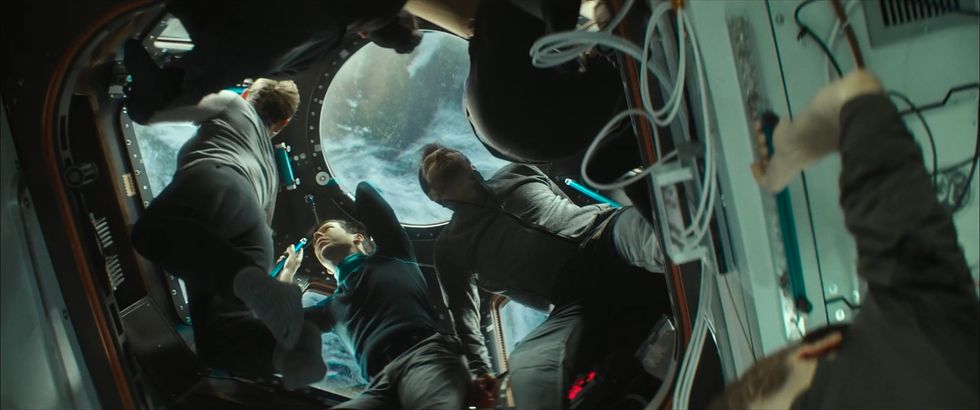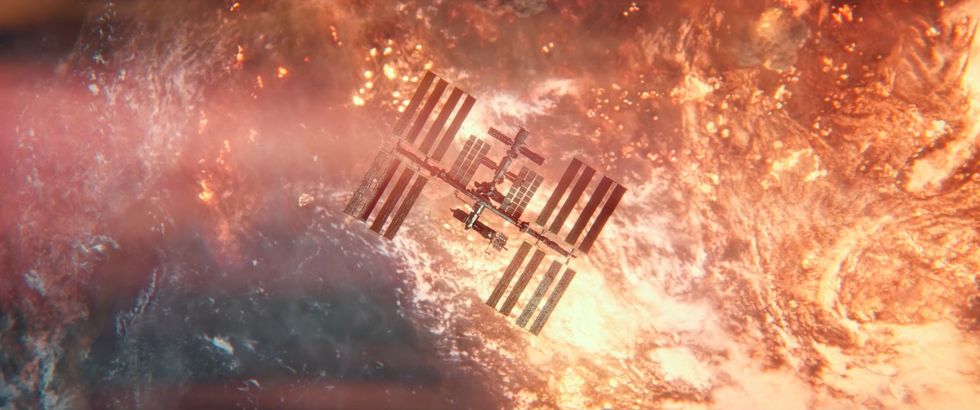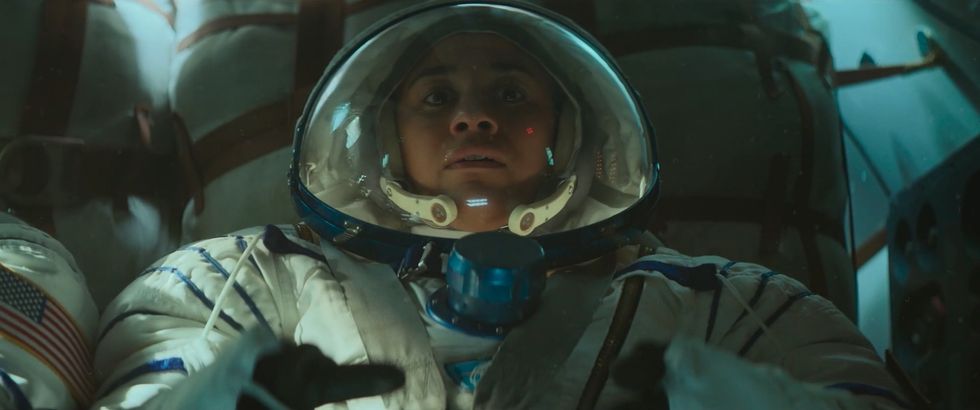
The Tribeca Film Festival was full of show-stopping premieres, like Vanessa Hudgens' Downtown Owl, Sara Bareilles' Waitress The Musical — Live On Stage!, and Ariana DeBose's I.S.S.. The latter, which takes place on the International Space Station, revolves around a group of astronauts who find themselves at odds when they all receive orders to take over by any means necessary. I talked to director Gabriela Cowperthwaite about emphasizing humanity in a story about chaos.
Our Interview With I.S.S. Director Gabriela Cowperthwaite

B+C: First off, congratulations on this film. I was on the edge of my seat the entire time! The title of the movie is I.S.S., so before you even see the first frame, you're focusing on the space station as a viewer and it affects every aspect of the movie. How did you use the unfamiliarity of that setting to underscore Kira's anxiety?
GC: One of the first things I did was bring in a look-book of like these shots of the space station. And they were all very real, [a very layered] human world. And so, in some ways that can feel kind of homey, right? I didn't want to make the really metal-y, aspirational, clean, streamlined look that sci-fi has, I think this is just the real space station...
But then other times it's just really unsettling. Like you're never on sure ground, right? Up is down. And it can be very scary and creepy. And so there were times I would look at it where I was like, this is like terrifying. You know, this is so claustrophobic and strange.
B+C: I love that you point out that you tried to avoid making it sci-fi shiny, because it does feature such rich textures and warm lighting.
G: It was definitely like, 'Let's try to let's try to make this feel human.' And also, the messiness, too, makes it feel unpredictable. Almost like, 'Gosh, if they can't even clean this up or figure this out, there's got to be a lot of stuff that's going to fall through the cracks.'
I want you to feel like we're just little humans who should not be up there. There's nothing about our bodies, about our lungs, about having that much radiation coming at you at all times when you're up there — that is not good for human beings. It's crazy that we're up there, so let's just underscore that a little bit by making this thing seem sort of otherworldly.

B+C: I love that idea of chaos, and the fact that the movie revolves around taking control, because chaos and control feel opposed to one another. There are so many little details the characters don't have control over, like the lack of gravity or depending on other people for their communication system. How did you use those little details to emphasize that lack of control?
G: The first thing that happens when you get up there is you realize that you're spinning, you know? Literally [and] metaphorically, you're spinning. Someone tells you there are these things called footholds, so Gordon [played by Chris Messina] is like, 'Put your foot in here and then you can feel like you're standing,' but you're not standing...That's not up and that's not down.
[The characters are also] conducting experiments. Like, that's part of what you do on the I.S.S., right? And so you're conducting experiments — I think the script was more like microbes and looking through microscopes, and I was like, 'I want to make it mice. I want to make it like where the mice are untethered.' [Because] at least you can tell somebody, rationally, 'This is not going to feel great. It's not going to feel great, but you're going to be okay.' But then you have these mice, they have no idea...
I read this in in Endurance by Scott Kelly [where] sometimes the mice will hurt themselves or hurt each other. There's so much anxiety and so much terror when you're untethered like that. So there's moments like that where you're just like, 'Okay, this is maybe not a great idea altogether to even be here.' Those are the types of things I kind of wanted to just infuse the script with and then shoot so that you could never feel completely like you have your bearings.
B+C: That definitely comes across when you're watching it. And even though the plot of I.S.S. is fictional, there are a ton of aspects that feel real. How did your previous experiences making documentaries affect the way that you tell fictional stories?
G: We all [know what "real" looks like] intuitively. And for me, I think that I could just see it. You could hear someone say a line and you're just like, 'That comes from inside them' or 'That comes from a script.' I for sure wanted it to feel almost like this documentary messiness, just so that you feel absorbed and you feel like you're there, and you're in this world. Because I want you to be able to kind of see yourself in this world, like you could be there. You don't have to be some sort of master scientist who has the right sentences to say in every single scenario, you don't have to be this perfect, aspirational, fake person that a lot of characters in movies can feel like. You're just as confused as Ariana [DeBose] is...
Those kinds of things I feel like will make you relate more to these people and imagine yourself being these people, because I think that's the point of the film — we could be any one of these people trying to humanize each other and being with each other, and then suddenly asked to do something that's just unthinkable...So making that kind of connection and making it feel authentic and real, I think was important for this movie to work.

B+C: To come back to the production of I.S.S., you filmed in Wilmington, North Carolina. I've been to Wilmington — I love it! Did you get to try any fun local spots?
G: Well, Wilmington did not see us at our best because we were in COVID, which was such a profound bummer...But I was at Wrightsville Beach [and] would walk every weekend there. My kids came out at one point and we just had an amazing assistant, Kat Hedrick, and she organized a boat tour where we could just go out [and] oh my gosh, it was so beautiful. People were so kind. It was like living in a dream.
B+C: Talking about that conflict between the characters, there was something that I really loved from a statement you gave, about how the movie is all about humanizing other people in the midst of conflict. How do you hope that theme impacts viewers?
G: If you think of your success, your happiness, your quality of life — whatever that is — necessitating or depending on somebody's demise, then we're going be the smallest, most insignificant species on the planet. And in some ways we might already be that, in terms of our own extinction and the things that we do that just grind us down as human beings. And I think that is maintaining that humanity, maintaining the ability to humanize someone who you're told a lie about. You're told that they're different from you [and] everything that guides their moral compass is completely different and off, and that you have got to do whatever you can to save yourself. That's just the biggest lie, right?
I'm hoping that we can continue to cut through that and continue to be like, 'Okay, yep, I hear what the system needs,' [but choose to] build a relationship that's interconnected, based on knowing each other as human beings. It would be a great way to do this and a great way to do life.
I don't have delusions of grandeur that people walk out of this film [ready to change the world], but with each of our films, everybody's just trying to say something little that might tweak your energy just a tiny bit, and make you realize how much cooler it would be to communicate and to humanize.
Check out our Tribeca Film Festival page for more!
This interview has been edited for clarity.
Lead image via Manny Carabel/Getty Images
